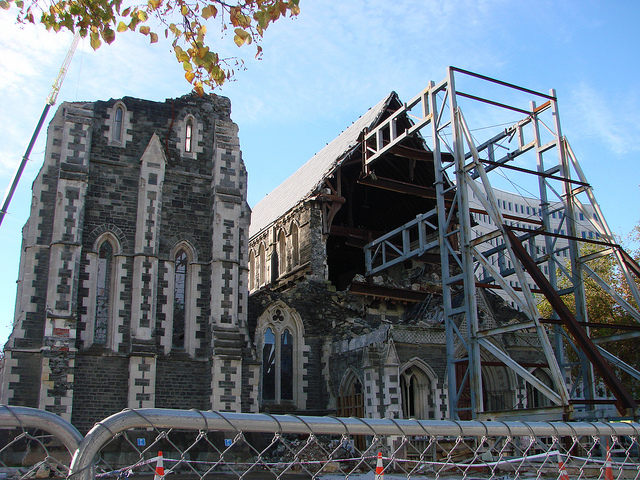
The impression of New Zealand from afar—and while you’re there—is of a beautiful country with friendly people and good food safely tucked away behind Australia and far from the traumas afflicting much of the world.
But in Christchurch, nothing feels safe or far away anymore.
As word of the terrorist attack swept across the city last Friday, hastened by the urgent sirens of ambulances and police cars and breaking news reports, kids phoned frantic parents on their mobile phones to tell them they were OK but scared and ask, ‘What’s happening, Mum?’
Then they saw it for themselves, live-streamed in all its gruesome cruelty. The smart phones—too smart—brought first the messages, received with relief, that ‘I’m OK’ and then the in-your-face horror of it all. Something kids should never see, scared and helpless people shot dead before their eyes.
On 4 September 2010, a massive earthquake struck the city and wrecked much of the central business district.
The quake struck at 4.35 am when few were out and about and the locals saw it as near miraculous that no one in Christchurch died, a lucky city in God’s own country.
There was money aplenty in a rich Canterbury farming region and they set about planning to rebuild an elegant city. Some people left but most stayed.
Then, on 22 February 2011, another severe quake hammered the city, demolishing buildings weakened by the first. This one struck at lunchtime, on a working day when streets were packed.
This time 185 people died and several thousand were injured. Most of the buildings in the CBD were destroyed or rendered so unsafe they had to be demolished later.
More people left, but again most stayed. The rebuild plans were extended. So much of the central city was cleared that resilience, optimism and ambition gathered momentum towards a vision of a new Christchurch rising as the rubble was cleared, of one of the world’s great clean, green, user-friendly cities.
As most of a decade passed and fear and residual trauma gradually faded with the receding aftershocks, temporary memorials gave way to permanent ones and optimism and normality returned.
Earlier on Friday, kids skipped school to stage a ‘strike’ in central Christchurch to demand that more be done to deal with climate change. They were old enough to remember the twin earthquakes but strong enough to deal with the memories.
Their protest done, they headed off with a slightly righteous, cheerfully defiant and festive air for coffee shops and schools and home. Until the warnings came, bus drivers were urged in radio calls to avoid locked-down districts, and the children fled to the safety of the nearest friends’ houses.
To reassure frantic parents—and then to be traumatised afresh by the live-streamed neo-Nazi killing spree.
‘Those poor kids’, said a tearful mother. ‘Christchurch doesn’t deserve this.’

